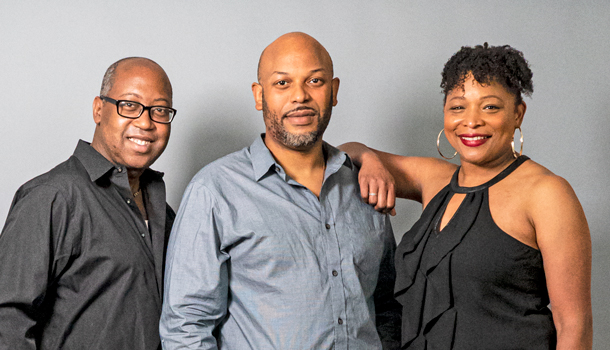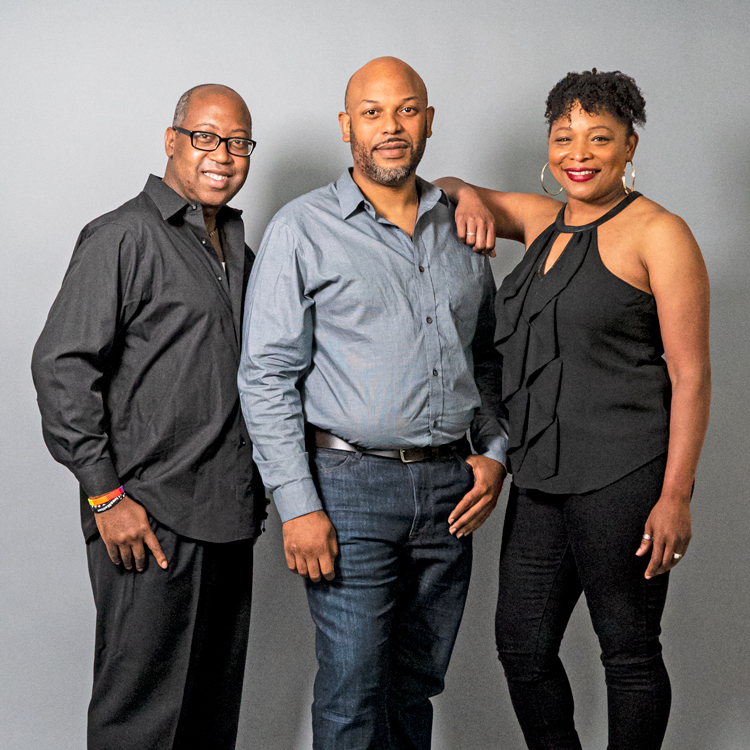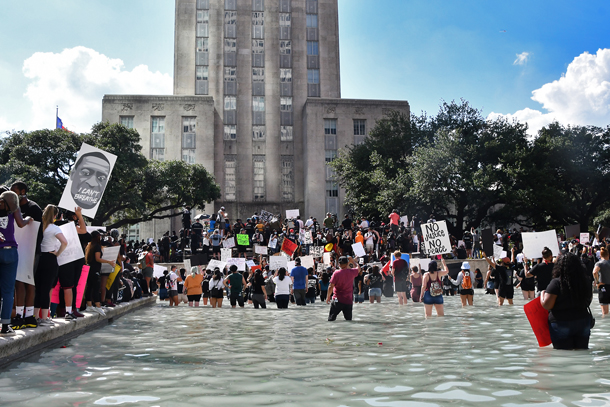
COVER STORY: Rallying for Racial Justice
Black Lives Matter: Houston leaders discuss their work and encourage others to get involved.

By Lillian Hoang and Terrance Turner
One year after Trayvon Martin, a Black 17-year-old, was shot to death in 2012 by 36-year-old George Zimmerman in Florida, Zimmerman was charged with and acquitted of second-degree murder. This clearing inspired people across the nation to take to the streets to protest and organize.
Three Black women—Alicia Garza and queer activists Patrisse Cullors and Opal Tometi—created the Black Lives Matter (BLM) organization and movement in July 2013 to affirm Black people’s humanity and “end State-sanctioned violence, liberate Black people, and end white supremacy forever,” according to BLM’s website. Following in their footsteps, several racial-justice activists founded local BLM chapters to do the same.
Ashton P. Woods, a Black gay man, founded Black Lives Matter Texas in 2013. The organization later became Black Lives Matter: Houston (BLMHOU) following the deaths of Michael Brown, a Black 18-year-old who was fatally shot by police officer Darren Wilson, and Sandra Bland, a 28-year-old Black woman who died while in police custody in Texas, according to the organization’s website. While BLMHOU focuses on Houston, its goal remains the same—to protect and uplift Black lives.
BLMHOU connects activists and supporters of the movement through social media by showing its more than 32,000 followers how to support the cause, from donating bail money for jailed protesters to participating in marches. BLMHOU also uses its platform to call attention to the violence Black people face, especially at the hands of police.

The organization made local headlines after hosting a march on May 29 in honor of Houston native George Floyd, a Black man who was killed on May 26 during an arrest by Minneapolis police officer Derek Chauvin, who knelt on Floyd’s neck for 8 minutes and 46 seconds.
Police brutality against people of color is occurring at alarming rates all over the United States, including Houston. Between 2013 and 2019, 34 Black people and 20 Hispanic people were reportedly fatally injured by the Houston Police Department (HPD), according to the latest data by Mapping Police Violence. The research collaborative also reported that 99 percent of police killings during this period did not result in officers being charged with a crime.
Recently, six Black and Brown men died while in HPD’s custody, and HPD has not released body-camera footage of these killings. Protesters confronted HPD Chief Art Acevedo at a protest on June 2, demanding the release of the footage. In a news conference on June 6, Acevedo and Mayor Sylvester Turner announced they decided to not release the videos out of concern and respect for the victims’ families, among other reasons.
Along with Woods, BLMHOU is helmed by two other Black members of Houston’s LGBTQ+ community: lead organizer Kandice Webber and organizer Brandon Mack. The group has shared information on—and organized demonstrations against—violence toward Black members of the LGBTQ+ community, including Black trans women such as Tracy Williams, who was murdered by her boyfriend, Joshua Bourgeois, in Houston in 2019. In the police report, an HPD detective misgendered and deadnamed Williams, who was one of many Black trans women killed in 2019. According to the Human Rights Campaign (HRC), last year 26 transgender or gender-nonconforming people in the U.S. were killed, “the majority of whom were Black transgender women.” BLMHOU also recently highlighted the police killing of Tony McDade, a Black trans man who was fatally shot by Florida police, and the murders of Black trans women Dominique “Rem’mie” Fells of Pennsylvania and Riah Milton of Ohio.
BLMHOU’s other efforts include providing mutual aid during disasters like Hurricane Harvey and the COVID-19 pandemic. The organization also works to correct or block xenophobic, racist, and nationalistic language in pending legislation, and has helped pass laws like the Sandra Bland Act, which was created to “divert people with mental-health and substance-abuse issues toward treatment, and requires that independent law-enforcement agencies investigate jail deaths,” according to The Texas Tribune.
BLMHOU organizers speak with OutSmart about their current efforts to promote racial justice.
For more information on Black Lives Matter: Houston, visit blmhouston.com. Keep up with the organization on social media @blmhou.
Spearheading the Movement
Ashton P. Woods
35 years old l Founder

Ashton P. Woods, who identifies as “unapologetically Black, gay, and HIV-positive,” is the founder of Black Lives Matter: Houston. He is a full-time local activist who currently lives in Southwest Houston and blogs about social-justice issues. Although he was born and raised in New Orleans, he became a Houston resident after Hurricane Katrina, which still has a profound impact on both Woods and his hometown.
In the summer of 2005, Woods was driving from Houston to visit his mother in New Orleans and surprise her for her birthday weekend. But as he made his way down Interstate 10, he received a phone call from his mother that stopped him in his tracks. She asked him to turn around after learning about a hurricane that was hurtling toward the city. Woods agreed and returned to Houston.
Just 48 hours later, his home in New Orleans became a shell of its former self, and he officially became a permanent Houston resident.
Woods remembers seeing former teachers, classmates, and people who looked like him walking through the flooded streets. He also saw National Guard troops, who were sent to help New Orleans, threaten Black nurses, doctors, bus drivers, and other community members. These experiences informed how he now operates as an activist.
“Our leadership and our policy makers don’t see us as humans,” he says. “They get away with taking too many liberties, and people die because of it. This really drives what I do today.”
In late May, Woods helped organize a march from Discovery Green to City Hall in George Floyd’s honor. Through social media, he coordinates and participates in similar events to highlight the violence that Black members of the LGBTQ+ community—especially Black trans women—face. “Women and LGBTQ+ people in general typically get erased from the Black Lives Matter narrative,” Woods says. “We’re talking about all Black lives mattering, not just some Black lives. All Black people.”
He has also provided Austin legislators with input and helped develop bills that support justice reform by addressing and targeting systemic racism in Texas. He calls for reform throughout the City of Houston, and has criticized HPD for paying officers more than $21 million for working overtime at recent Houston demonstrations following Floyd’s death. Woods argues those funds could be better used elsewhere, such as backing Black farmers and local health clinics that have been impacted by COVID-19.
Despite public calls to defund HPD, the Houston City Council increased HPD’s budget by $20 million in the 2021 City budget. Police funding is a sticking point for Woods, who is calling for HPD’s abolition without apologies. “The line has been drawn in the sand, and people need to pick a side,” Woods says.
Woods wants to see more transparency from Mayor Turner. Although Turner has done well regarding COVID-19 policies, Woods notes, he has neglected to address homelessness and the racial disparities in housing and healthcare. (Black Americans are more likely to have pre-existing conditions, like diabetes and heart disease, that lead to worse outcomes for COVID-19. According to the APM Research Lab’s analysis, Black people are 2.3 times more likely to die from the virus as white and Asian people.)
COVID-19 has only increased Woods’ responsibilities. He and his BLMHOU team organized a gift-card drive and have been collecting and distributing personal protective equipment to medical workers in need. But this is nothing new to Woods, who helped Houston’s underserved and overlooked communities following Hurricane Harvey in 2017.
When asked how others can support the Black Lives Matter cause, Woods says it’s important for people to show up and be their honest selves.
“[Let people know] how you feel about this issue, especially if you’re Black,” he adds. “If you’re white, be a comrade. Show up when you’re needed. This fight is far from over, and I don’t see this ending anytime soon.”
An Advocate for Black Women
Kandice Webber
44 years old l Lead Organizer

As the lead organizer for Black Lives Matter: Houston, Kandice Webber, a Black lesbian and registered nurse who lives in Third Ward with her wife, manages community engagement, access to K–12 public education for Black children, and issues primarily affecting Black women.
As the lead BLMHOU organizer, she gathers relevant information and resources and presents her findings to the team. Then, as a group, BLMHOU develops a plan of action. The bigger the turnout, the more work that goes on. Organizing a march can take a couple of weeks, Webber says. But the goal remains the same—protecting Black lives.
“Whatever we do in the community, whether it’s publicized or private, our first deep assessment is whether we’re doing everything we need to do to protect Black lives, [which requires a strategy],” she says.
Before COVID-19, depending on the community’s concerns and whether there was an immediate crisis, Webber conducted research on the current state of education in Houston. Then she met with people and organizations that have similar agendas to figure out how they can collaborate and work toward a shared goal. However, since the pandemic, she says it has become more challenging to organize since she can no longer knock on doors like she used to.
She has had to come up with different ways to target and reach various populations in the Black community, and has found success through social media.
Her career in activism started after the 2016 election. Webber says she was quiet about her contributions to the election and mostly acted as a donor. However, after Donald Trump was elected president, she says she realized giving money was not enough.
“I don’t have the money to give to make huge changes, so I need to give my time, and that’s [when my career in activism] started,” she says.
Webber decided to dedicate her time to public education for children and issues affecting Black women. People were soon referring to her as an activist and reaching out to her as a reliable information source.
Ultimately, working for children in education and addressing issues Black women experience remains her top priority.
Webber is passionate about schooling because she was a product of public education, and believes she would not be where she is today without the access she had to established public schools.
“I’m not special or anything; I’m not brilliant. I’m just as capable as the person standing left or right of me,” she says. “[Black people] need to be given the same opportunity to succeed.”
She wants the same access to public education for Black children, especially with the closing of schools populated by vulnerable and underserved demographics, which opens the door to gentrification, charter schools, and food deserts. (Food deserts are urban areas where fresh, affordable food is difficult to find. According to Rice University’s Kinder Institute, around 500,000 Houstonians live in United States Department of Agriculture-defined food deserts.)
“Black people do not want handouts,” she says. “We want our own equal and fair opportunity. If we do not educate our children, we will constantly come up short and be reliant on compassion from people who have never shown us compassion.”
Webber says her desire to support and help others comes from growing up around nurses. Her love of math, science, and education encouraged her to become a nurse. She stayed in nursing after witnessing how the healthcare system failed to treat Black men, women, and children.
“There is a huge need for Black and Brown healthcare professionals because Black and Brown people make up a large portion of patients, and they deserve to feel safe,” she says. “We encounter racism in every arena we step into, and in healthcare, [that] could be life or death. Medical racism, negligence—these are a few reasons why I [am still a registered nurse].”
COVID-19 has also impacted Webber outside of her nursing job and as BLMHOU’s lead organizer. As a full-time registered nurse in critical care, she has seen many Black and Brown people die from COVID-19. According to the Centers for Disease Control and Prevention, Black and Hispanic (or Latinx) people have substantially higher death rates due to COVID-19 than white or Asian people. A Harvard study on COVID-19 this year found that Black Americans are up to nine times likelier to die from COVID-19 than their white counterparts.
“On a professional and personal level, that’s hard to watch,” Webber says. “We are grieving the people that have died in our community from the coronavirus disease just like everyone else, and we’re trying to make sure that the people in [the] community have access to the PPE they need.”
Advocates can help by fighting for equal access to healthcare and pay, Webber says. People can also show up for marches, as well as offer their skills and donate to local organizations in the Black community.
Webber adds that LGBTQ+ advocates should reflect on the thoughts they have about people of color, since the LGBTQ+ community also belongs to Black and Brown folks.
“It belongs to all of us, but we don’t always feel welcomed in this community,” she says. “Being gay does not mean that you’re not racist. So interrogate that, and protect Black trans women. The Black queer community is growing. We are unifying and uplifting each other’s efforts. We mean it when we say, ‘We’ve waited long enough.’”
Creating Educational Opportunities
Brandon Mack
36 years old l Organizer

When Brandon Mack, a Houston native and gay Black man who lives near NRG Stadium, is not busy with his duties as the Houston GLBT Political Caucus screening chair, he is an organizer for Black Lives Matter: Houston. His position at BLMHOU focuses on LGBTQ+ issues and access to higher education for Black and Brown students.
Due to the organization’s unconventional, decentralized structure, the responsibilities of BLMHOU members often overlap. Each BLMHOU member has a different focus, and they work together while avoiding the hierarchy of traditional systems of power, Mack explains.
“[Ashton, Kandice, and I] are all members of the LGBTQ+ community; we all work on criminal justice reform [and] LGBTQ+ issues,” he adds. “While Kandice, being a Black woman, focuses on issues related to Black women, we all work with each other on these issues.”
Mack has been an organizer at BLMHOU since its inception. He strives to make higher education more accessible for Black and Brown LGBTQ+ students by conducting research on LGBTQ+ support services, talking to students about the admissions process and learning opportunities, and working with Black students and organizations to improve educational access.
Mack is also part of the team that sets up stages for rally speakers, secures the routes for BLMHOU marches, and ensures megaphones are available and functioning, giving protest participants the chance to air their grievances.
Ultimately, he works to uplift often-ignored voices like his own.
Mack has always been passionate about justice, especially when it concerns Black members of the LGBTQ+ community. He became involved in activism to address the issues and hurdles that Black LGBTQ+ community members face. Essentially, he wanted his voice, and others like his, to be heard.
“In LGBTQ+ spaces, there have been few Black people at the table, and yet other people are talking about ‘them’ and what ‘they’ need,” says Mack. “Why [isn’t the LGBTQ community] reaching out to our community to ask us what we need and [how they can respond to] our issues?”
Mack is not a fan of the “ally” model, and instead prefers the terms “comrades” and “accomplices.” He sees allies as people who step in and out of the movement as they please, and don’t necessarily feel the Black community’s losses. Comrades, on the other hand, are in it for the long haul, feeling the same losses as they join in the fight for change.
“This movement is not just in this moment, but continuous,” he says. “Take the way you’re feeling and responding, and continue with this movement. Don’t step out.”
People can help cause change in many ways, says Mack. For one, folks can reach out and offer to help organizations in need without co-opting them. He stresses “offering” rather than “co-opting” because he believes that Black LGBTQ+ issues must be addressed by Black LGBTQ+ leaders.
“Notions coming from [a legacy of] white supremacy and white privilege have no place dictating what goes on in this movement,” he says. “Don’t come into this space and say, ‘This is wrong.’ You need to listen and take the advice of those who are leading.”
People can also help by contacting their representatives in Congress, on the Houston City Council, and on the Houston Independent School District Board, urging officials to support policies that end police brutality and anti-Black violence. Folks can contribute to the fight by making their workplaces more equitable and friendlier for their Black colleagues.
Like Kandice, Mack says change can occur in the LGBTQ+ community when it addresses and tackles the racism he sees within that community.
“It starts with the way we view and treat each other,” he says. “There shouldn’t be any argument about the Black and Brown stripe added to the rainbow flag, but people argue about that, [and it shows me that] you don’t see me and my Blackness as being a part of this community. Inclusion and equity start with us getting equity, even within our LGBTQ+ community.”
This article appears in the July 2020 edition of OutSmart magazine.











FB Comments